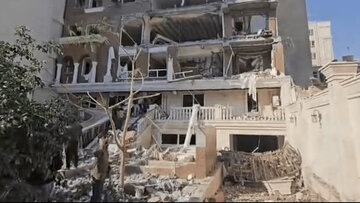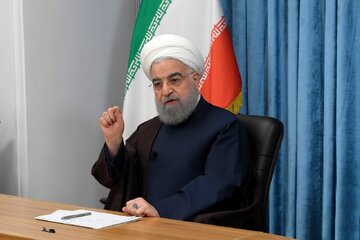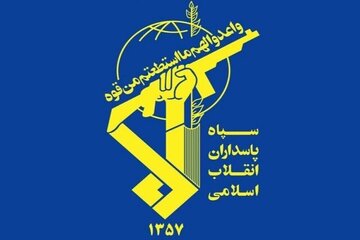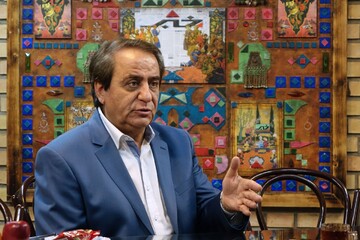Tehran Emrooz Daily’s Interview with Kayhan Barzegar, Director of the Institute for Middle East Strategic Studies
The expression of readiness by the P5+1, the permanent members of the United Nations Security Council plus Germany, for negotiations with the Islamic Republic of Iran over its nuclear program, which was welcomed and responded positively by Tehran, is the latest development in the process of the Iran-West nuclear talks. On the one hand, the P5+1 has asked for serious, sustained and unconditional negotiations with Iran. On the other hand, the International Atomic Energy Agency (IAEA), which has once again lodged a request to visit the military site of Parchin, is witnessing Tehran’s readiness to continue cooperating with the Agency on its nuclear activities. In this respect, Iran’s position during the upcoming talks with the P5+1, the reaction of the West, and the degree of Chinese and Russian support for Iran constitute the most important issues that Tehran Emrooz has brought up in an interview with Dr. Kayhan Barzegar, Director of the Institute for Middle East Strategic Studies and Chair of the Department of Political Science and International Relations at the Science and Research Branch of the Islamic Azad University in Tehran. The full text of the interview follows:
Tehran Emrooz: It seems that the trajectory of Iran’s nuclear issue has changed. At the beginning, the complete halt of the whole Iranian nuclear program was on the agenda, but now the issue of trust-building tops the discussion, which in turn shows a type of change in the West’s approach towards the venture. With this in mind, what do the current nuclear negotiations look like? And does the Western agreement to enter into talks with Iran once again mean that the West intends to start them from the second step that is accepting Iran as a nuclear state?
Kayhan Barzegar: In my view, the P5+1 is gradually coming to terms with the existing reality of Iran’s nuclear program and simply tries to manage and control the progress degree of the program by means of holding negotiations from the position of power. I think Iran is ready to cooperate, but again there is the issue of the level of cooperation and the other side’s intention. Here, the main challenge between the two sides is their differences on the negotiations agenda. The West’s view, dominated by the American approach, asserts that the West should force Iran to change its nuclear policies via slapping tough sanctions against it and accordingly they hope such a policy shift will ultimately take place. These harsh sanctions include economic embargos and intense political pressure which are enforced both in the framework of international institutions such as the UN Security Council and by means of unilateral measures.
Now the new challenge that has even complicated the issue is that the European Union has politically aligned itself with the United States over the Iranian nuclear program and hopes to change Iran’s nuclear direction in this way. At present, the West seeks to focus only on Iran’s nuclear issue during the negotiations, but Iran sees the settlement of this controversy in the broader context of general and comprehensive security issues in the region. In other words, there is a difference of perspective here and it is based upon this difference that whenever Iran enters into talks over its nuclear activities, it strives to broaden the scope of the negotiations and connect them to the general security issues such as the peaceful use of nuclear energy and even regional peace and security. In this context, the enrichment of uranium in Iran is raised as an irreversible issue and Tehran’s most important bargaining card in the course of negotiations. The Western view, however, seeks the suspension of uranium enrichment as a confidence-building measure and as the main feature of the so-called serious talks. This is the principal point of difference between the two sides.
Tehran Emrooz: So with the situation you described, there should not be any hope for a successful negotiations and like the past the future talks is doomed to fail because the two sides are likely to stand on their current position. What do you think?
Kayhan Barzegar: Well, it depends. To my mind, the very fact that talks are repeatedly postponed indicates that both sides are trying to work out the agenda according to which they should engage in negotiations. From the Iranian perspective, enriching uranium on Iran’s territory is irreversible and non-negotiable. The P5+1 members are experiencing, in a broader context, an internal challenge as to how they should come to terms with this issue. Along these lines, the Europeans, Americans, Russians and the Chinese are trying to reach a point of balance and determine from where they should start the upcoming talks with Iran. If the West’s current position does not change or they do not show any creativity to change it, the negotiations will most probably get nowhere.
All these factors taken into account, now the fundamental questions concerns how a balance can be achieved within the P5+1 group between the American approach, which is the dominant trend and primarily views Iran’s nuclear program from the standpoint of deterrence and weaponization, European approach, which to some extent accepts the legitimacy of uranium enrichment on Iran’s soil, and the Russian as well as Chinese approaches, which slightly differs and emphasizes the right of Iran to conduct peaceful nuclear activities and holds that imposition of further sanctions on Iran will only complicate the issue and will not be helpful at this stage. If such a balance is struck, I think the negotiations can make progress. At any rate, Iran will always be interested in negotiations because it can express its demands in the course of the talks.
Tehran Emrooz: Is there any consensus within P5+1 on the Iranian nuclear program? To what extent may they succeed in creating such a consensus? Or perhaps there is no real consensus at all, but kind of a consensus has taken shape only as an idea?
Kayhan Barzegar: No real consensus is achieved yet, but there is a huge effort by the U.S. to make such a consensus or at least showing that such consensus already exists. Now Iran thinks that it is only a few steps away in making the West accept the reality of its nuclear program and that the West will ultimately acknowledge it. At present, one of the most significant issues concerns the scope of bargaining and the way in which Iran's nuclear activities should be managed within the legal framework of the IAEA in the future. I personally believe that the position the West has adopted is beyond putting a halt to the enrichment process, and rather concerned with enforcing stricter inspections of Iranian nuclear facilities in the future. Already, the latest statement by Yukiya Amano insisting that Iran did not allow the IAEA inspectors to visit such sites and facilities as Parchin – which the agency suspects may harbour nuclear weaponization activities – shows that the West has altered its strategy towards broadening the scope of undeclared inspections and is seeking to set a new definition or interpretation for the Additional Protocol. In other words, they are trying to enforce a new protocol, which is designated for Iran, and is different from the conventional protocol, the one that Iran voluntarily agreed to implement during 2004-2006. This is because some perspectives in the West believe that the current protocol does not have the necessary mechanisms and is not strict enough to control Iran's nuclear program so that the concerns of Western powers over the issue are eliminated. Therefore, they are likely to seek the establishment of a new additional protocol with a broader scope and greater power of inspections.
Tehran Emrooz: The Islamic Republic of Iran has stated that it is not obliged to implement the Additional Protocol of the Non-Proliferation Treaty and new bilateral agreements should be clinched in order for the agency to be able to inspect the intended sites. But, the IAEA has lodged a request for visiting the Parchin military facilities regardless of Iran's different stance. What is your take on this issue?
Kayhan Barzegar: Well, Iran is rather distrustful of the IAEA inspections’ activities and generally considers them in the context of Western pressure. Therefore, the key point concerning Tehran’s implementation of the Additional Protocol is that of initial trust-building and permitting further access to the Agency beyond its regular rights would lead to further pressures on Iran and even the possibility of bringing the nuclear activities to a halt, which happened in the past. Another important point concerns what the West is supposed to do for Iran in return for so much cooperation on its part with the Agency. Iran often sees the IAEA's measures and behavior from a political perspective, not simply as a technical issue, which is why the Iranian ambassador to the IAEA Ali Asghar Soltanieh says there is no problem with the agency’s plan to visit Parchin, but it should be done within a clear and predefined framework. As far as the terms and principles of the Non-Proliferations Treaty are concerned, Iran has cooperated with the IAEA as much as it could, and now perhaps it expects the other side to take some steps towards trust-building in return, such as a positive report that may lead to the lift of sanctions, some minimalist steps at least to show the trust, which the Agency has never tried to take because of the dominance of American and Israeli views in it on Tehran’s nuclear program.
Tehran Emrroz: China and Russia have both announced that talks between Iran and the IAEA have been positive regarding this issue as an important reason for the peaceful nature of Tehran’s nuclear activities. Given this, can Iran's disagreement to the IAEA's inspection of the Parchin site be an excuse which the U.S. may use to convince China and Russia into accepting that Tehran does not have the necessary cooperation with the agency and thus persuade them to align them with the West over Iran's nuclear issue?
Kayhan Barzegar: For sure, the West is seeking to win the support of Russia and China on the issue, but I think the scope of Chinese and Russian support for the West in the case of Iran's nuclear program has certain limits. To my mind, sometime in the past Russia and China followed the Western line too closely, which in turn increased differences and areas of distrust between the two contending sides. Now they have apparently come to the conclusion that Iran's nuclear standoff can be solved through diplomatic means and that the West is making excessive demands vis-à-vis the issue. It is true that both Russia and China voted for the 1929 UN Security Council resolution against Iran, but then they later arrived at the conclusion that the Western powers were pushing the case ahead according to their own interests. Therefore, there are serious doubts now about the willingness of Beijing and Moscow this time to align themselves with Washington on the issue.
Tehran Emrooz: In the course of the talks, Russia’s position has fluctuated somewhat. What do you think of the Russia policy regarding Iran's nuclear program?
Kayhan Barzegar: Well, Russia is an important player in the context of world’s nuclear activities and Iran should benefit from Russia’s traditional role in any circumstances. Yet, in my view, Iran should pay attention to the depth of Russia’s strategic view of the Iranian nuclear program. Iran’s independent uranium enrichment and nuclear activities might not be in accordance with Russia’s interests. Because Moscow seeks to maintain its traditional influence in handling Iran's nuclear program to secure the economic benefits of providing Tehran with nuclear fuel and technology, building new atomic power plants in Iran, exporting expertise and technology and so on. Also, from the perspective of the nuclear geopolitics and the Russian conventional superiority in the region, Moscow obviously seeks to be in a position to control all nuclear activities in the region. So such plans as the “step-by-step” initiative, proposed by the Russians to resolve Iran’s nuclear standoff, might be positive, but Iran should be careful enough to avoid the limitations that might be imposed on the pace of its nuclear activities in this process. Interestingly, it is at this point where Russia’s conduct gets close to that of the West. Generally speaking, however, Moscow is opposed to imposing threats and force and harsh sanctions by the West against Iran. Therefore, we are witnessing some fluctuations in Russia’s behaviour in the sense that at times its position becomes more in line with that of the West and at times it distances itself from the West and adopts a more independent stance. And now with the election of Vladimir Putin as the next Russian president, I think Russia will return to its more independent and traditional position. In any case, one should take note of the fact that Russia’s decision to act more in harmony with the West or distance itself from it will depend upon the extent to how its interests are met.
Tehran Emrooz: Given the differences between the American and European approaches towards Iran’s nuclear program, the United States has repeatedly declared that it is waiting to see the effect of sanctions against the Islamic Republic of Iran. With this in mind and Iran’s announcement that it will offer new initiatives and ideas during the upcoming talks, do you predict any positive outlook for the nuclear negotiations?
Kayhan Barzegar: Yes, I think the prospects can be positive in the sense that both sides should realize the fact that this issue can not last forever and that reaching a peaceful solution needs some compromises that can be acceptable for both sides. Iran has been cooperating and should go further if necessary. The West and particularly the U.S. should also realize the reality that the imposition of harsh and strict sanctions on Iran wouldn’t have the necessary impact on its nuclear policies, and that given the significance of geostrategic and national aspect of the issue, dealing with Iran’s nuclear case through imposing economic pressure wouldn’t produce the expected result. In this event, another course the U.S. can take is the option of war, which is unrealistic given the current circumstances in the Middle East region, the domestic conditions in the United States itself, along with the opposition of the U.S. public opinion to waging war, and finally given the current global economic recession which will certainly be exacerbated by the increasing oil prices if a war breaks out. Therefore, one cannot claim that Washington is getting ready to launch a war against Iran.
T ehran Emrooz: The issue of starting war with Iran has been widely mentioned in the course of last couple of months and that with this direction both sides are heading towards a seemingly “inevitable” war. What is your view on this?
Kayhan Barzegar: In spite of the fact that President Obama asserts all options are on the table, I do not think he is a hawkish and war-mongering figure. It is likely that the pressure exerted by Israeli lobbies and American hardliners may push Obama to take even harder position in the coming months. But one should remember that war will prove very risky for the Obama administration on the eve of the presidential elections because of its unpredictable consequences as well as the existing circumstances.
There is of course another side to this issue, that is, at the beginning of his term in office, President Obama proclaimed that he will try to resolve Iran’s nuclear issue by peaceful means. Notably, moving towards this point in the run up to the U.S. presidential elections in November 2012 can bring him more legitimacy and more votes than moving towards waging war against Iran. We should thing of the positive side as well. True that the nuclear issue brought about a lot of challenges between the two sides, but one should think that it is the sole issue that can lead the two sides towards strategic talks because there is a consensus among the ruling elites of both sides to engage on this issue. The escalation of crisis and tension in relations between states does not necessarily lead to war, but as the history of international relations has demonstrated in many cases, it can result in diplomacy and the peaceful settlement of disputes and differences. I think the two sides should take advantage of the existing opportunity.
Regarding the mood in our country, the prevailing view among the Iranian elites and public is that the United States wouldn’t attack Iran. This might be wrong, but I think this mindset is an advantage that exists in Iran. I think it is a historic mistake that President Obama is fanning the flames of war into the two nations’ relations. He might want to show force to the Iranian government, but the result would damage the two nations’ relations. Now we are on the eve of Nowruz, the new Iranian Year of 1391. I remember President Obama’s first Nowruz message which was very positive and looking forward. With the daily talks of war and sanctions, an opportunity has turned into a threat. Now, Iranian families’ main topic of discussion in their Nowruz visiting would be the likelihood of American military attack or President Obama’s harsh economic sanctions policy that mainly affected the families’ economic standard of living.
Tehran Emrooz: It seems that Israeli threats of military action against Iran are becoming increasingly serious. One may look at the issue from three viewpoints: First, Israel feels really threatened by the Iranian nuclear program and in fact believes that the Islamic Republic is reaching the nuclear threshold. Second, the West is making use of Israel as an instrument and trying to push it to the front of confrontation with Iran. And third, Tel Aviv has lost its hope in the West and is warning that it will take unilateral action against Iran on its own. What is your assessment of the issue?
Kayhan Barzegar: Israelis always express that the Americans shouldn’t judge their sense of threat and insecurity in the region because they are not in their position. This is the perspective of hard-line Israelis. We should not, however, overlook the role of Israeli public opinion in this regard. The Israeli public opinion is opposed to waging war against Iran. The Israeli regime’s policy portraying Iran’s nuclear program as an “existential threat,” and the necessity of destroying it, which I believe is an overblown exaggeration, will simultaneously lead Iran to feel insecure from the Israeli nuclear arsenal. One might think that what lies behind this claim is in fact Tel Aviv’s aspiration to preserve its nuclear monopoly in the region, which is itself the main source of insecurity in the region from an Iranian perspective. The Americans should realize that beyond Israel, there are other states in the region that have security concerns. There should be therefore a sort of balance when dealing with the regional political-security issues in a comprehensive context. Here, working on the idea of a Middle East without nuclear weapons could be very useful that can bring about initial signals of confidence-building.
Israelis prefer that if an attack is supposed to be launched against Iran, the United States take such an action, because if they launch a strike themselves, it will incur enormous political, security, and strategic costs for the whole region and create a serious gap within the West itself, among the great powers, and even between the West and its Arab conservative allies in the region. Therefore, the Israeli regime is trying to carry out such a task via American hands, on which U.S. officials have not yet reached a consensus of course. This is why we are hearing and witnessing new positions adopted by President Obama, Israeli Prime Minister Benjamin Netanyahu, and President Shimon Peres. After all, the consequences of such a move, in regional and economic terms and with regard to the challenge it poses to the U.S. interests and status in the region, as well as the application of double standards by Washington in the region, are very complex.












نظر شما